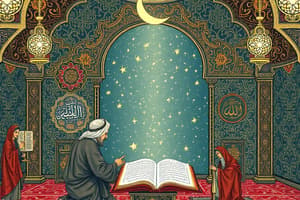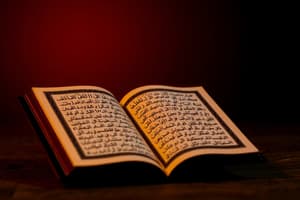Podcast
Questions and Answers
Who is considered the first prophet in Islam?
Who is considered the first prophet in Islam?
- Moses
- Abraham
- Noah
- Adam (correct)
What is the core belief that every prophet in Islam preached?
What is the core belief that every prophet in Islam preached?
- The belief in many gods
- The Oneness of God (correct)
- The belief in reincarnation
- The worship of idols
What is the quality that prophets have in Islamic teaching that other human beings do not have?
What is the quality that prophets have in Islamic teaching that other human beings do not have?
- The quality of ʿiṣmah, i.e., being protected by God from making mistakes or committing grave sins (correct)
- The ability to perform miracles
- The ability to predict the future
- The ability to speak to God directly
How many prophets are mentioned by name in the Quran?
How many prophets are mentioned by name in the Quran?
What is the role of prophets and messengers in Islam?
What is the role of prophets and messengers in Islam?
Which prophetess is mentioned in the Tawrat as well as being the fourth Judge of pre-monarchic Israel?
Which prophetess is mentioned in the Tawrat as well as being the fourth Judge of pre-monarchic Israel?
What is the belief of the Ahmadiyya Community regarding prophethood?
What is the belief of the Ahmadiyya Community regarding prophethood?
What do the Baháʼís believe about the title 'Seal of the Prophets'?
What do the Baháʼís believe about the title 'Seal of the Prophets'?
What is the importance of obedience to prophets in Islam?
What is the importance of obedience to prophets in Islam?
Flashcards
Prophets in Islam
Prophets in Islam
Prophets in Islam serve as messengers of God and models of exemplary behavior. They convey God's message, promoting core beliefs like monotheism, worship, and avoiding idolatry.
Who are the prophets in Islam?
Who are the prophets in Islam?
Muslims believe that every community has received a prophet, including those not mentioned in the Quran. Adam is considered the first prophet, and Muhammad is the last, known as the "Seal of the Prophets."
What do prophets preach?
What do prophets preach?
Prophets preach the core tenets of Islam: belief in the Oneness of God, worshipping only God, abstaining from idolatry and sin, and acknowledging the Day of Judgement and afterlife.
What is ʿiṣmah?
What is ʿiṣmah?
Signup and view all the flashcards
Prophets' Messages
Prophets' Messages
Signup and view all the flashcards
Miracles of Prophets
Miracles of Prophets
Signup and view all the flashcards
Muhammad and Abraham
Muhammad and Abraham
Signup and view all the flashcards
Revealed Books
Revealed Books
Signup and view all the flashcards
Divine Gifts to Prophets
Divine Gifts to Prophets
Signup and view all the flashcards
Study Notes
Prophets in Islam are individuals who spread God's message on Earth and serve as models of ideal human behavior. Muslims believe that many prophets existed, including many not mentioned in the Quran. The Quran states that for every community, there is a messenger. Muslims believe that the first prophet was also the first human being, Adam, created by God. The last prophet in Islam is Muhammad ibn ʿAbdullāh, whom Muslims believe to be the "Seal of the Prophets". In Islam, every prophet preached the same core beliefs: the Oneness of God, worshipping of that one God, avoidance of idolatry and sin, and the belief in the Day of Resurrection or the Day of Judgement and life after death. Classical Islamic teaching, especially Shia Islam, teaches that unlike other human beings, prophets have the quality of ʿiṣmah, i.e., are protected by God from making mistakes or committing grave sins. Some were called to prophesy late in life, while some were called to prophesy at a young age. The Tawrat mentions that Deborah was a prophetess as well as the fourth Judge of pre-monarchic Israel. The question of Mary's prophethood has been debated amongst Muslim theologians. Abraham is widely recognized for being the father of monotheism in the Abrahamic religions. Prophets and messengers in Islam often fall under the typologies of nadhir ("warner") and bashir ("announcer of good tidings").Prophets in Islam: Their Messages, Warnings, and Legitimacy
- The Quran emphasizes the rewards of Paradise and the warnings of the Day of Judgement.
- Prophets in the Quran perform miracles through God and are only mortals who can testify to God's omnipotence.
- Muhammad is analogous to Abraham in many aspects of his prophecy, including the rejection of his message and the need for divine consolation.
- The revealed books, including the Quran, are records dictated by God to Islamic prophets throughout history.
- The Quran mentions various divinely-bestowed gifts given to various prophets, including wisdom and celestial knowledge.
- The Quran was revealed in Arabic to Muhammad, making it culturally applicable to the peninsula and unique to other religious texts of the time.
- The Quran mentions 25 prophets by name but also states that God sent many other prophets and messengers to different nations on Earth.
- The Ahmadiyya Community believes that the same individuals perform the roles of warner, prophet, and messenger, and that non-law-bearing prophethood continues subordinate to Muhammad.
- The Baháʼís believe that the title "Seal of the Prophets" applies to a specific epoch and that each prophet is the "seal" of his own epoch.
- Islamic literature mentions other individuals, including scholars in the Hadith, exegesis, and commentary.
- The Quran emphasizes the importance of obedience to prophets and their messages.
- The Quran speaks of respecting all previous scriptures and emphasizes the belief in all revealed books as an article of faith in Islam.
Studying That Suits You
Use AI to generate personalized quizzes and flashcards to suit your learning preferences.




